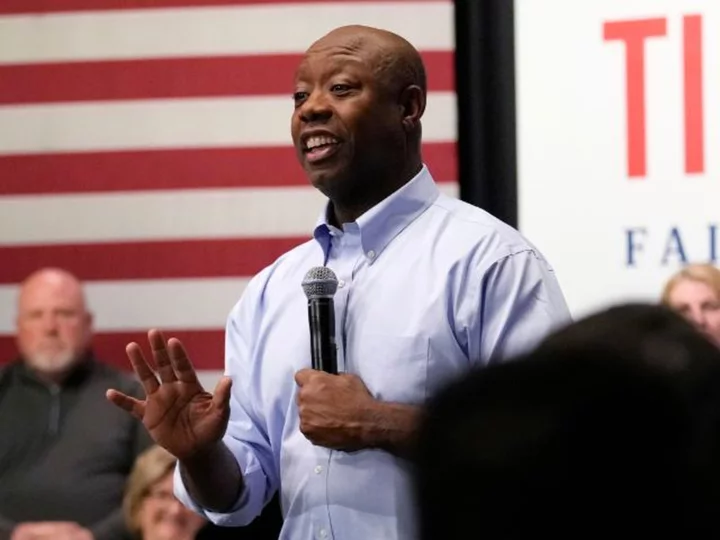Donald Trump continues to be the clear favorite to win the 2024 Republican presidential nomination.
Most of his rivals -- from South Carolina Sen. Tim Scott to former Vice President Mike Pence -- have a game plan to slow down the Trump train: Compete hard in the first-in-the-nation Iowa Republican caucuses, now scheduled for January 15.
The idea makes sense on its face. These candidates have to beat Trump somewhere, so why not do it in the first contest where they can potentially change the narrative.
There are just a few problems with this proposition. First, a Trump loss in Iowa is by no means a guarantee of anything for the non-Trump Republicans based on history. Second, the polling suggests the voters among whom Trump is most vulnerable are more plentiful in the state with the second-in-the-nation contest: New Hampshire.
Republican presidential candidates are currently flocking to Iowa as they have every four to eight years in modern memory. They go to fairs, eat corn and pizza, and ask Iowans for their vote.
Many hope to upend the national front-runner at the Iowa caucuses, as Mike Huckabee (2008), Rick Santorum (2012) and Ted Cruz (2016) have done before.
All those candidates, however, then proceeded to lose the New Hampshire primary and the party nomination.
Iowa, it turns out, has not been very good at picking Republican nominees for president. In primary seasons since 1980 that didn't feature a GOP incumbent, the Iowa winner went on to win the nomination two times. Both times, that candidate had been the national front-runner prior to his Iowa win (Bob Dole in 1996 and George W. Bush in 2000). Five other Iowa winners did not become the nominee.
One reason Iowa hasn't done nearly as well at predicting nominees is that socially conservative candidates often appeal to the state's religious conservative base. Religious conservatives tend to have an outsize influence in the Hawkeye State compared with other states.
New Hampshire has had a significantly better track record. Republican primary voters there have picked the eventual nominee in five out of seven elections since 1980 without an incumbent GOP president. This includes the last three primary seasons without an incumbent, while Iowa, at the same time, has gone 0 for 3.
Of course, 2024 could end up being like 1996 or 2000, when Iowa went with the eventual nominee while New Hampshire did not. We have a limited historical sample size.
That said, there are also a few characteristics about New Hampshire Republicans that indicate they may be more open to a Trump challenger than Iowa Republicans this time around.
We have seen, for example, ideology play a major role in how Republicans view Trump. Polling has consistently shown the former president to be far weaker in the center of the GOP political spectrum than he has been on the right -- which is a change from 2016 when Trump was weakest among "very conservative" voters.
Trump's national polling lead over Florida Gov. Ron DeSantis in last month's Quinnipiac poll, for example, dropped from 41 points among the very conservative to 31 points among those who were somewhat conservative to 14 points among moderate and liberal potential Republican primary voters.
New Hampshire GOP primary voters are usually more moderate than their counterparts in Iowa. In 2016, 40% of Iowa Republican caucusgoers described themselves as very conservative, according to the entrance polls before voting began. Only 26% of New Hampshire Republican primary voters identified the same way. The percentage who called themselves moderate or liberal in New Hampshire (29%) was nearly double that in Iowa (15%).
Trump has also been weaker among demographic groups who make up a larger share of the New Hampshire Republican electorate.
Income, which was not too much of a predictor of primary voting patterns in 2016, seems to be playing a bigger role this year.
Our most recent CNN/SSRS poll found, for example, that Trump had a 27-point lead over DeSantis among potential Republican primary voters with a household income of less than $100,000. His advantage over DeSantis among those making $100,000 or more was a mere 3 points.
Although the 2016 Iowa entrance poll did not ask about income, the 2020 general election exit poll did. Among self-identified Republicans in Iowa, 26% had a total family income of $100,000 or more. Among self-identified Republicans in New Hampshire, 48% of them did.
(Note: Household and family income are somewhat different measures, but I'm merely demonstrating that New Hampshire Republicans are, on the whole, wealthier than Iowa Republicans.)
Perhaps, it should come as no surprise that former New Jersey Gov. Chris Christie seems to be the rare Republican basing his campaign in New Hampshire and not Iowa. Christie is by far the most anti-Trump candidate registering in the polls at all.
His chance of winning the nomination is slight, but he seems to have the right idea.
If Trump is going to get tripped up in the 2024 primary, the numbers suggest his opponents would be wiser to focus more on New Hampshire than on Iowa.









